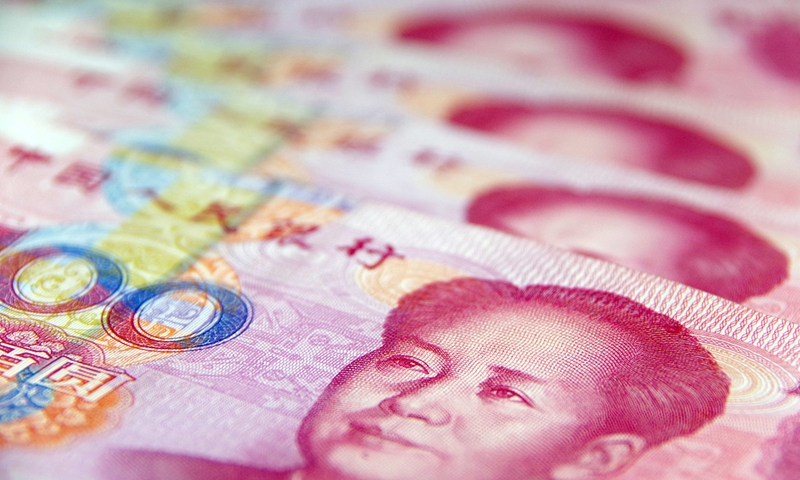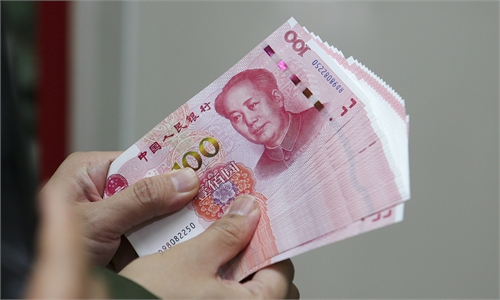
RMB Photo:VCG
The US Federal Reserve on Wednesday raised its benchmark interest rate by a half percentage point, marking the sharpest rate hike since 2000, as it takes more aggressive steps to rein in the highest levels of inflation seen in four decades.
Although the US rate hike will have spillover effects on major economies, it is likely that China will maintain monetary policy independence and use monetary policy tool as part of pro-growth measures amid the downward pressure caused by COVID-19 flare-ups, one market watcher noted.
Chinese capital remained resilient and responded calmly to the US interest hike on Thursday. More than 3,800 stocks across A-share market rallied. By morning closing, the Shanghai Composite Index edged up by 1.11 percent and Shenzhen Component Index up 1.07 percent. The tech-heavy ChiNext board closed down 0.15 percent.
Chief Executive of the Hong Kong Monetary Authority Eddie Yue said on Wednesday that the US Federal Reserve's decision to raise interest rates and reduce the size of its balance sheet was expected by the market and the interest rate hike will not affect Hong Kong's monetary and financial stability.
The US Federal Open Market Committee (FOMC), the Fed's policy-making body, decided to raise the target range for the federal funds rate to 0.75 to 1 percent, the Fed said in a statement after a two-day policy meeting.
While the US has taken aggressive steps to ramp up its fight against inflation , given the current situation in China it is likely that China will continue to adopt easing policy to shore up the economy weighing down by the COVID-19 flare-ups, veteran financial expert Zhao Qingming told the Global Times on Thursday, adding that there is still room to cut interest rates and reserve requirement ratios as monetary tools.
China's central bank on April 15 announced a universal 25 basis points of reduction in banks' reserve requirements to 8.1 percent, which will release about 530 billion yuan ($83.18 billion) in long-term capital.
“The market is still expecting an interest rate cut in May. After China has kept benchmark loan prime rate unchanged for third straight month in April there is room for a cut,” Zhao said.
The strengthening dollar combined with domestic economic downward pressure amid multiple COVID19 flare-ups across the country could extend depreciation pressure on the yuan's exchange rate, Zhao said.
The yuan exchange rate continued weakness since the second half of April and offshore yuan has lowered about 6.69 per dollar during intraday trading on Tuesday amid economic downward and expectations of US interest rate hike, Wind Data showed.
Judging from the historical experience of yuan exchange rate fluctuations, Zhao predicted that this round of retreat may see the stabilizing boundary at the exchange rate of 6.70 or 7.00 against the dollar, two key supporting levels.
Amid the yuan's accelerated depreciation, China’s central bank on April 25 announced cuts to foreign exchange reserve requirements for financial institutions by 1 percentage points to 8 percent to shore up the capacity of financial institutions to use foreign exchange funds.
In the long run, China‘ssound economic fundamentals will support the yuan's exchange rate to remain stable at a reasonable level, experts and officials said.
Wang Chunying, a deputy director and spokesperson of the State Administration of Foreign Exchange, said at a press conference on April 22 that China's foreign exchange market has the foundation and conditions to adapt to the current round of Fed policy adjustments, citing a resilient Chinese economy, long-term positive development and an expected current account surplus.
China's economy, on the whole, has stabilized within a reasonable range and remains resilient. Continued efforts to stabilize growth policies and increased support for the real economy have helped balance underlying economic situation, Wang said.
“The fundamentals of the economy will remain stable and sound in the medium- and long-term, which will continue to attract all kinds of capital to invest in the domestic market,” Wang said.

